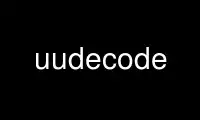
This is the command uudecode that can be run in the OnWorks free hosting provider using one of our multiple free online workstations such as Ubuntu Online, Fedora Online, Windows online emulator or MAC OS online emulator
PROGRAM:
NAME
uudecode - decode an encoded file
SYNOPSIS
uudecode [-flags] [-flag [value]] [--option-name[[=| ]value]] [<file>...]
If no file(s) are provided, then standard input is decoded.
DESCRIPTION
uudecode transforms uuencoded files into their original form.
The encoded file(s) may be specified on the command line, or one may be read from standard
input. The output file name is specified in the encoded file, but may be overridden with
the -o option. It will have the mode of the original file, except that setuid and execute
bits are not retained. If the output file is specified to be /dev/stdout or -, the result
will be written to standard output. If there are multiple input files and the second or
subsquent file specifies standard output, the decoded data will be written to the same
file as the previous output. Don't do that.
uudecode ignores any leading and trailing lines. It looks for a line that starts with
"begin" and proceeds until the end-of-encoding marker is found. The program determines
from the header line of the encoded file which of the two supported encoding schemes was
used and whether or not the output file name has been encoded with base64 encoding. See
uuencode(5).
OPTIONS
-o file, --output-file=file
direct output to file.
If specified, decoded data are written to this file. When multiple inputs are
specified on the command line, this option cannot be specified. All decoded data
must be written to the file name encoded in the data.
-c, --ignore-chmod
ignore fchmod(3P) errors.
By default, if the output file permissions cannot be changed to the permissions
specified in the encoded data, the file will not be written out and execution
stops. This option will cause that error to be ignored. The resulting file will
have all the data, but the incorrect mode settings.
fchmod() errors are also ignored if POSIXLY_CORRECT is set in the environment. RE:
http://austingroupbugs.net/view.php?id=635
A warning is always emitted when fchmod() fails.
-h, --help
Display usage information and exit.
-!, --more-help
Pass the extended usage information through a pager.
-R [cfgfile], --save-opts [=cfgfile]
Save the option state to cfgfile. The default is the last configuration file
listed in the OPTION PRESETS section, below. The command will exit after updating
the config file.
-r cfgfile, --load-opts=cfgfile, --no-load-opts
Load options from cfgfile. The no-load-opts form will disable the loading of
earlier config/rc/ini files. --no-load-opts is handled early, out of order.
-v [{v|c|n --version [{v|c|n}]}]
Output version of program and exit. The default mode is `v', a simple version.
The `c' mode will print copyright information and `n' will print the full copyright
notice.
OPTION PRESETS
Any option that is not marked as not presettable may be preset by loading values from
configuration ("RC" or ".INI") file(s). The file "$HOME/.sharrc" will be used, if
present.
STANDARDS
This implementation is compliant with P1003.2b/D11.
Use uudecode online using onworks.net services
